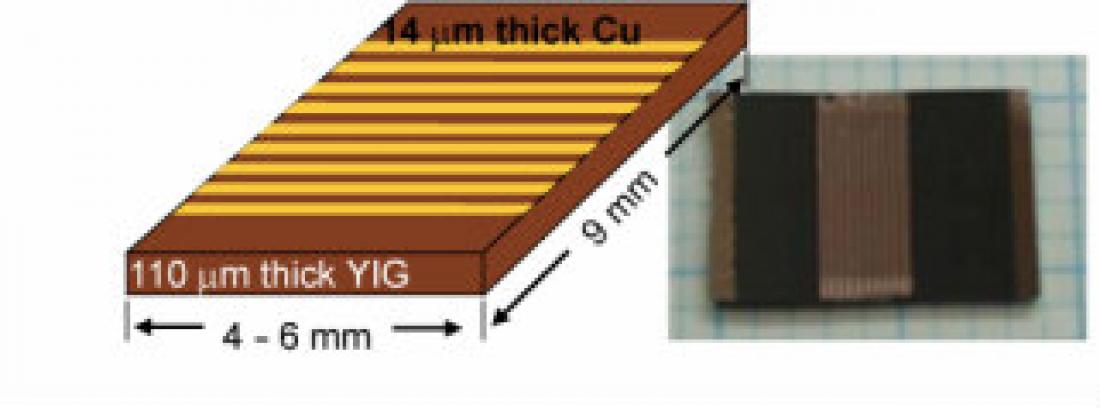Schematic illustration (left) and photograph (right) of the one-dimensional magnonic crystal
High sensitivity magnetic sensors are important in medical diagnostics for applications such as monitoring heart and brain activities, where mapping distributions of localized extremely weak magnetic fields arising from these organs could provide early warning of life threatening diseases and malfunction.
Mitsuteru Inoue and colleagues at Toyohashi University of Technology (Toyohashi Tech) have developed high sensitivity magnetic sensors using magnonic crystals—artificial magnetic crystal structures capable of controlling the propagation of magnetostatic waves. Magnonic crystals support the propagation of magnetostatic waves through the crystal spin system or suppress the propagation of waves due to the periodicity of the crystal structure.
In this research the Toyohashi Tech researchers fabricated magnonic crystals by the direct formation of one-dimensional arrays of metal strips on yttrium iron garnet (YIG)—a ferromagnetic material widely used in the magneto-electronics industry— which serves as the propagation medium. The metal stripes induce an attenuation band in the frequency spectra of the magnonic crystal and restrict the propagation of waves of specific frequencies.
Even at room temperature, the output signal of the devices—frequency of the attenuation band—is very sensitive to external magnetic fields applied to the YIG crystal, where a one Oersted change in the field causes a 2.6 MHz shift in the attenuation band gap. Importantly, the maximum detection sensitivity of the magnonic crystals is more than 10 times greater that of giant magneto-impedance devices.
Next the researchers are planning to demonstrate the measurement of magnetic fields in three dimensions.
Reference:
Mitsuteru Inoue et.al (2011) :Investigating the use of magnonic crystals as extremely sensitive magnetic field sensors at room temperature. Applied Physics Letters 98, 132511. DOI: 10.1063/1.3567940
Further information:
Ms. Junko Sugaya and Mr. Masashi Yamaguchi
International Affairs Division
TEL: (+81) 0532-44-2042; FAX: (+81)0532-44-6557
E-mail:[email protected]
About Toyohashi University of Technology:
Founded in 1976, Toyohashi University of Technology is a vibrant modern institute with research activities reflecting the modern era of advanced electronics, engineering, and life sciences.
About the Electronics-Inspired Interdisciplinary Research Institute (EIIRIS):
EIIRIS is Toyohashi Tech’s new flagship research complex launched on 1st October 2010. "The aim of EIIRIS is to produce world-class innovative research," says President Yoshiyuki Sakaki. "To do this we are bringing together ambitious young researchers from diverse fields to collaborate on pioneering new frontiers in science such as brain/neuro-electronics as well as tackling some of the major issues mankind faces today: issues such as environmental changes and aging societies."



